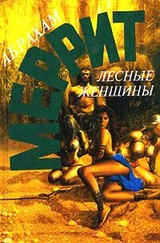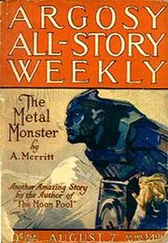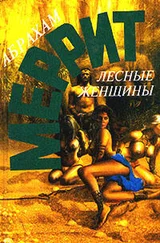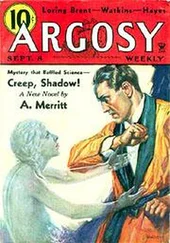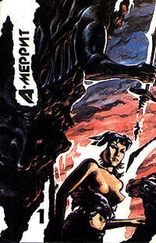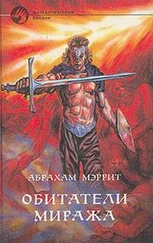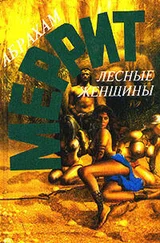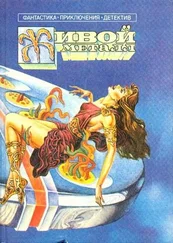Абрахам Меррит - The Ship of Ishtar
Здесь есть возможность читать онлайн «Абрахам Меррит - The Ship of Ishtar» весь текст электронной книги совершенно бесплатно (целиком полную версию без сокращений). В некоторых случаях можно слушать аудио, скачать через торрент в формате fb2 и присутствует краткое содержание. Год выпуска: 2014, Издательство: epubBooks Classics, Жанр: Фэнтези, на английском языке. Описание произведения, (предисловие) а так же отзывы посетителей доступны на портале библиотеки ЛибКат.
- Название:The Ship of Ishtar
- Автор:
- Издательство:epubBooks Classics
- Жанр:
- Год:2014
- ISBN:нет данных
- Рейтинг книги:5 / 5. Голосов: 1
-
Избранное:Добавить в избранное
- Отзывы:
-
Ваша оценка:
- 100
- 1
- 2
- 3
- 4
- 5
The Ship of Ishtar: краткое содержание, описание и аннотация
Предлагаем к чтению аннотацию, описание, краткое содержание или предисловие (зависит от того, что написал сам автор книги «The Ship of Ishtar»). Если вы не нашли необходимую информацию о книге — напишите в комментариях, мы постараемся отыскать её.
The Ship of Ishtar — читать онлайн бесплатно полную книгу (весь текст) целиком
Ниже представлен текст книги, разбитый по страницам. Система сохранения места последней прочитанной страницы, позволяет с удобством читать онлайн бесплатно книгу «The Ship of Ishtar», без необходимости каждый раз заново искать на чём Вы остановились. Поставьте закладку, и сможете в любой момент перейти на страницу, на которой закончили чтение.
Интервал:
Закладка:
Then fallen—abandoned by the gods. Then crumbling—abandoned by man; the desert creeping on it; at the last covering it.
Then—forgotten!
There came a whirlpool of images, grey and indistinct in the swiftness of their passing. They steadied. He saw men working in the sands that were Babylon's shroud. He recognized among them—Forsyth! He saw the block unearthed; borne away by tall Arabs; saw it crated into a primitive cart drawn by patient little rough–coated ponies; watched it tossing in the hold of a ship that sailed a sea he knew; watched it carried into his own house―He saw himself as he freed the ship! He looked again into the shadowy eyes. "Judge!" sighed the harp strings. "Not yet!" whispered the still voice. Kenton looked again into that immeasurable space wherein he had first seen radiant power and dark. But now he saw within it countless flames like those which had burned in the breasts of Ishtar's priestess and the Lord of Death's priest; saw infinity flecked and flaming with them. They burned deep down through the shadows, and by their light up from the darkness came groping multitude upon multitude of other flames that had been shrouded by the darkness. He saw that without those flames the radiance itself would be but a darkness!
He saw the ship as though it floated in that same space. As he gazed a deeper shadow flitted from the soul of the blackness and brooded over it. Instantly something of the soul of the radiance rayed out and met it. They strove, one against the other. The ship was a focus of hatred and of wrath from which, visibly, waves swung out in ever widening circles. As the waves circled outward from the ship the shadow lines that ran from the core of darkness grew darker, thicker, as though they sucked strength from those waves. But under their beat the radiance dulled and the countless flames flickered and swayed, and were troubled.
"Judge!" whispered the cold tones of Nabu. Now Kenton in this dream of his—if dream it was—faced dilemma; hesitated. No trivial matter was it to indict this power—Ishtar, goddess or whatever that power might be in this alien world where, certainly, it was powerful indeed. Besides, had he not prayed to Ishtar and had she not answered his prayer? Yes, but he had prayed to Nabu, too, and Nabu was Lord of Truth—
His thoughts shaped themselves into words of his own tongue, his familiar idioms.
"If I were a god," he said, simply enough, "and had made things with life, things with lives to live, men and women or whatever they might be, I would not make them imperfect, so that they must, perforce through their imperfections, break my laws. Not if I were all powerful and all wise, as I have gathered gods—and goddesses—are supposed to be. Unless, of course, I had made them only for toys, to play with. And if I found that I had made them imperfect and that therefore they did wrong, I would think that it was I who was responsible for their sinning—since being all powerful and all wise I could have made them perfect but did not. And if I had made them for my toys I surely would not heap upon their heartbreak and misery, pain and sorrow—no punishments, O Ishtar—not if they were toys that could feel these things. For what would they be but puppets dancing through their day as I had fashioned them to do?"
"Of course," said Kenton naively, and with no ironic intention, "I am no god—and most certainly could not be a goddess—nor until I came into this world have I had any conscious experience with either. Yet, speaking as a man, even if I had punished any one who had broken my laws I would not let my anger run on and hurt any number of people who had nothing whatever to do with the original cause of my anger. Yet that, if what I have just beheld was true, is what this strife for the ship seems to bring about.
"No," said Kenton, very earnestly, and quite forgetting the vague faces hovering about him. "I can't see any justice in the torment of that priest and priestess, and if the struggle for the ship does the damage it appears to, I certainly would stop it if I could. For one thing I would be afraid that the shadow might get too thick some time and put all the little flames out. And for another—if I had spoken a word in anger that made all that misery I wouldn't let that word be stronger than myself. I wouldn't as a man. And if I were a god or goddess—very certainly, indeed, I would not!"
There was a silence; then—
"The man has judged!" whispered the still voice.
"He has judged!" the vast ripple of the harp strings was almost as cold as that other. "I will recall my word! Let the strife end!"
The two faces vanished. Kenton raised his head and saw around him the familiar walls of the rosy cabin. Had it been all a dream? Not all—those scenes he had beheld had been too clear cut, too consecutive, too convincing.
Beside him Sharane stirred, turned his face to hers.
"What are you dreaming, Jonkenton?" she asked. "You were murmuring and muttering—strange words that I could not understand."
He bent and kissed her.
"I greatly fear, heart of mine, that I have offended that goddess of yours," he said.
"Oh—Jonkenton—but no! How!" Sharane's eyes were terrified.
"By telling her the truth," answered Kenton; then unveiled to Sharane all of his vision.
"I forgot she is—a woman!" he ended.
"Oh—but beloved, she is all women!" cried Sharane.
"Well—that makes it all the worse then!" said Kenton, ruefully.
He leaped up; threw his cloak about him and went out to talk to Gigi.
But Sharane sat thinking, long after he had gone, with troubled eyes; at last walked to the empty shrine; threw herself before it, prostrate; praying.
29
How the Strife Was Ended
"WHAT BEGAN on the ship must end on the ship!" said Gigi, nodding bald head wisely when Kenton had told him also of that vision of the two faces. "Nor do I think we shall have long to wait before we see that end."
"And after?" asked Kenton.
"Who knows?" Gigi shrugged broad shoulders. "No rest for us. Wolf, while Klaneth lives. Nay—I think I know What this darkening of shadows on black deck means. By those shadows Klaneth watches us. They are the thread by which he follows us. Also my skin is sensitive, and it tells me the black priest is not so far away. When he comes—well, we conquer him or he conquers us, that is all. Also, I do not think that you can count on any help from Ishtar. Remember that in your vision she promised only that the strife of the Wrathful One and the Dark One should end. She made no promises, I gather, as to Sharane or you—or the rest of us."
"That will be well," said Kenton cheerfully. "As long as I am given chance to stand fairly, face to face with that swine bred from hell swill Klaneth, I am content."
"But I think you gathered that she was not mightily pleased with what you had to say to her," grinned Gigi slyly.
"That is no reason for her punishing Sharane," answered Kenton, harking back to his old thought.
"How else could she punish you?" asked Gigi, maliciously—then suddenly grew serious, all impishness gone. "Nay, Wolf," he said and laid paw on Kenton's shoulder; "there is little chance for us. And yet—if all your vision were true, and the little flames you saw were real—what matters it…
"Only," said Gigi, wistfully, "when those flames that were you and Sharane journey forth into space and another flame comes to you that once was Gigi of Nineveh—will you let it journey with you?"
"Gigi!" there were tears in Kenton's eyes. "Where ever we go in this place or any other, no matter what may happen—you go with us as long as you will."
"Good!" muttered Gigi.
Sigurd shouted at the rudder; he pointed over the ship's bow. To Sharane's door they sped and with her through the cabin of the maids and out beneath the sickled prow. Across the horizon ran a far flung line of towers and minarets, turrets and spires and steeples, skyscrapers and mosques; a huge chevaux–de–frise. From where they stood, the outlines of this bristling barrier seemed too regular, too smoothly shaped, to be other than the work of man.
Читать дальшеИнтервал:
Закладка:
Похожие книги на «The Ship of Ishtar»
Представляем Вашему вниманию похожие книги на «The Ship of Ishtar» списком для выбора. Мы отобрали схожую по названию и смыслу литературу в надежде предоставить читателям больше вариантов отыскать новые, интересные, ещё непрочитанные произведения.
Обсуждение, отзывы о книге «The Ship of Ishtar» и просто собственные мнения читателей. Оставьте ваши комментарии, напишите, что Вы думаете о произведении, его смысле или главных героях. Укажите что конкретно понравилось, а что нет, и почему Вы так считаете.
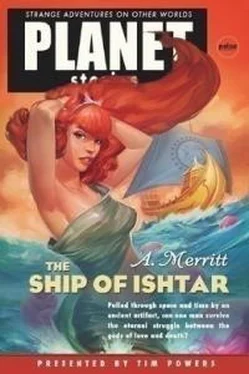
![Абрахам Меррит - Лунный бассейн [Лунная заводь]](/books/20623/abraham-merrit-lunnyj-bassejn-lunnaya-zavod-thumb.webp)
